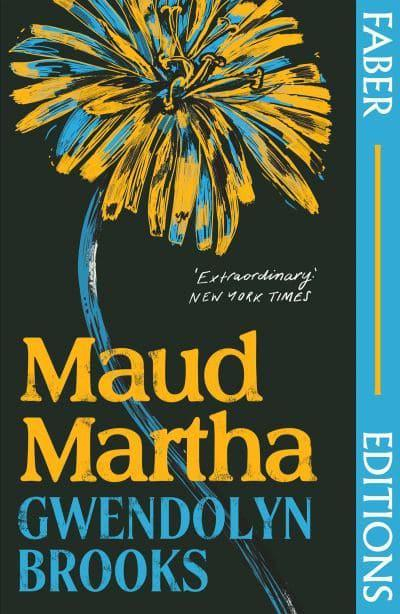
Maud Martha
GWENDOLYN BROOKS (Faber & Faber)
First published in 1953 Maud Martha is the sole novel by Pulitzer Prize winning African American Poet Laureate Gwendolyn Brooks 1917-2000. It should seem a quaint period piece about race, sadly it stands as beautifully eloquent and relevant as it did on its first appearance. The conversations it provokes anew, as pertinent in a different century, a sure indication that change occurs slowly, and usually takes backward steps.
Shaped via collection of painterly, personal episodes, thirty-four to be precise. Though often erroneously described as non-linear in construction, more on account of its brilliantly unorthodox sentences, than any absence of actual plot, this is a "coming of age" affair. Truly a poet's flexible collision with prose, an exercise in rendering the mundane profound, capturing great insights from small thoughts and events.
The issues tackled remain thorny. Seen through the eyes of a young black girl in Chicago, the reader is touched by her many realisations about her racial identity. The casual acceptance of her race of the 'n' word so as not to appear techy, the elevation of her pale skinned sister over her darker complexion, and the fact Maud Martha is grateful that her honey colored husband has chosen a wife less pretty and as dark as she.
Brooks writes with a deceptively poetic dreaminess, but one that entails no lack of bite. Her short sections possess a visceral edge honed by astute observations on the meaninglessness, meaningful aspects most lives encapsulate. Her patronage from ignorant white employer, so engrained its perpetrator is oblivious of her crime. Still shockingly pertinent.
The novel ends with the close of World War 2, in a tone of hopeful resolution.
"But the sun was shining, and some of the people in the world had been left alive, and it was doubtful whether the ridiculousness of man would ever completely succeed in destroying the world -- or, in fact, the basic equanimity of the least and commonest flower, for would its kind not come up again in the spring? come up, if necessary, among, between or out of -- beastly inconvenient! -- the smashed corpses lying in strict composure, in that hush infallible and sincere."
The flower in question the humble dandelion, the same bloom whose beauty she praises so eloquently at the novel's inception. As humanity continues to destroy its habitat, and those left defenseless, Gwendolyn Brooks' masterful little parable about race, has tendrils that caress the nature of the entire human condition.
A multi-faceted gem, deft, wise and beautiful.
